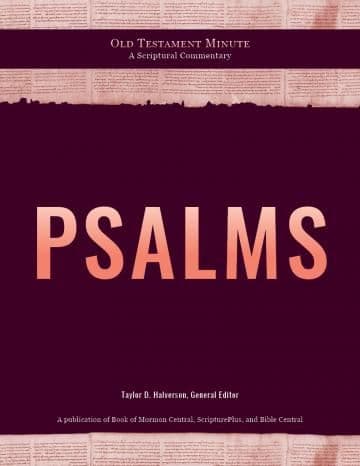Book
10 Chapters

Psalm 30 is another in the series of Psalms 25–31, which are notable for their focus on themes of covenant and temple. The temple context of Psalm 30 is not abundantly clear, but the superscription indicates that the psalm was used for the dedication of the temple (although if the psalm were written by David, the assertion is anachronistic since the temple was dedicated under Solomon).[fn]Although the King James Version translates the line as “at the dedication of the house of David,” several modern translations render it as “for the dedication of the temple; of (by) David.” See Psalm 30 in the New International Version, New American Bible, New Revised Standard Version, English Standard Version, and others. Although it may not have been used for the dedication of Solomon’s temple, it may have been an earlier psalm that was later used as part of the second temple’s dedication. The Talmud indicates that it was used for the celebration of Hanukkah (b. Sop 18b), which involved the cleansing and (re)dedication of the temple under Judas Maccabaeus.[/fn]
The psalmist’s declaration in verse 3 that the Lord “brought up my soul from the grave” has been the source of some debate. Was the psalmist (who is traditionally thought to be King David) claiming to have been resurrected from the dead? Some, including Orthodox Christians, read the psalm as a prophecy of Christ’s Resurrection. The mention of the speaker’s being healed by God in the previous verse may indicate that he was not brought back from actual death but from a serious, perhaps nearly fatal, illness or injury. He was grateful that the Lord “kept me alive” and did not let him go down to the pit (Sheol, or death).
In words reminiscent of Nephi’s Psalm (see 2 Nephi 4:23, 35), the psalmist recounted how he “cried unto” the Lord (verse 8) and the Lord lifted him up (verse 1) out of his awful predicament. The night of weeping became the morning of joy, mourning turned to dancing, and sackcloth was replaced with the clothing of gladness. The psalmist declared the Lord to be a merciful helper, deserving of everlasting praise.
Psalms 86:13; 150:4; Ecclesiastes 3:4; 2 Samuel 6:14; Isaiah 61:3, 10; Acts 2:34; 2 Nephi 4:23, 35
Book
10 Chapters
Items in the BMC Archive are made publicly available for non-commercial, private use. Inclusion within the BMC Archive does not imply endorsement. Items do not represent the official views of The Church of Jesus Christ of Latter-day Saints or of Book of Mormon Central.